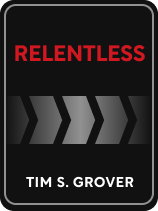

This article is an excerpt from the Shortform book guide to "Relentless" by Tim Grover. Shortform has the world's best summaries and analyses of books you should be reading.
Like this article? Sign up for a free trial here .
Do you want to be unstoppable in life? Do you want to be better than just “good” or “great?”
Settling to be average won’t push you to achieve more in life. In Relentless, Tim Grover discusses the two main qualities that you need to be unstoppable: the need to succeed and the ability to direct your instincts. Within those two qualities are six strategies to help you along the way.
Here’s how to be unstoppable in life, according to Grover.
The Unstoppable Need to Succeed
To know how to be unstoppable in life, you have to be consistently relentless, according to Grover. We’ll start by defining the need to succeed through three different principles that support this quality:
- Never stop improving
- Put intense pressure on yourself
- Use any means necessary
1. Never Stop Improving
Grover says that constantly seeking improvement is a crucial part of doing everything you can to achieve your goals, and therefore is crucial for acting relentlessly. In addition, by constantly pushing as hard as you can to improve, you’ll better understand what you’re capable of and how you can use those capabilities to succeed.
Grover recommends three methods that will help you commit to constant improvement:
- Don’t define what’s impossible
- Never settle for “good enough”
- Surround yourself with relentlessness
2. Put Intense Pressure on Yourself
Grover’s second principle for developing the unstoppable need to succeed in life is constantly putting intense pressure on yourself. Grover agrees with the commonly observed phenomenon that people perform better under pressure, and that being under pressure forces you to find ways to rise to whatever challenge you’re facing.
Constant pressure allows you to avoid the fear of failure and self-doubt in two ways:
- Constantly putting yourself under pressure gives you lots of practice managing the fear and stress that comes with it, so you’ll improve at managing these feelings.
- Internal pressure makes external pressure easier to handle. Others depending on you or having high expectations of you won’t cause fear or panic because the pressure they put on you can’t be any more intense than the pressure you put on yourself.
3. Use Any Means Necessary
Pushing yourself hard to improve and pressuring yourself are two essential principles to satisfying your need to succeed. However, to get the most out of these principles, Grover argues that you must follow the third principle behind the unstoppable need to succeed: seeking success by any means necessary.
Grover argues three principles are crucial for following the principle of using any means necessary to succeed: make sacrifices, accept discomfort, and ignore judgments.
The Unstoppable Direct Their Instincts
We’ve just explored the first main quality to learn how to be unstoppable in life, the need to succeed, and discussed how you can productively fulfill this need. Now, we’ll explore Grover’s second unstoppable quality: the ability to direct your instincts—that is, the ability to use your natural animal instincts to accomplish the complex goals required by your field or discipline.
Next, we’ll examine three areas Grover says to direct your instincts—knowledge, emotions, and your primal self as well as how doing so will help you become unstoppable.
1. Instinctively Using Knowledge
Acting on instinct, argues Grover, means acting without consciously thinking—this allows you to better use knowledge of your discipline because you can just act on your knowledge without having to think about the best way to use it. Thinking opens you up to self-doubt and fear, damaging your confidence and, as a result, your ability to be relentless. On the other hand, by directing your instinct to use your knowledge automatically, you’ll be able to act immediately with no distractions or self-doubts holding you back.
2. Instinctively Controlling Emotions
Grover explains that acting on instinct also helps control your emotions when you’re aiming to be unstoppable. This is crucial for consistent relentlessness because as we’ve discussed, strong emotions like fear and uncertainty can cause you to freeze up or doubt yourself—preventing you from acting relentlessly.
Grover explains that acting instinctively helps you control your emotions because it activates intense focus: a state of mind where you block out all emotions except for focused, determined anger. Acting instinctively activates intense focus because you’re acting without conscious thought—you don’t have time to let in distractions or emotions other than determined anger.
3. Access Your Primal Self
Lastly, to be unstoppable in life Grover declares that you must access your primal self: the person you are when acting entirely through instinct. Directing your instincts productively is the foundation for this step because it ensures you’ll still relentlessly pursue your goals even when acting impulsively.
Grover explains that to access your primal self, you must indulge primal desires: things you impulsively want, but keep secret because society tells you to (like sex, drugs, or gambling). Indulging primal desires allows you to practice accessing your primal self even when relaxing, making it easier to access when seeking success in your field.

———End of Preview———
Like what you just read? Read the rest of the world's best book summary and analysis of Tim Grover's "Relentless" at Shortform .
Here's what you'll find in our full Relentless summary :
- The qualities you’ll need to become the best in your field
- Why sacrifices and discomfort are necessary for growth
- Why you should practice indulging in your primal self






